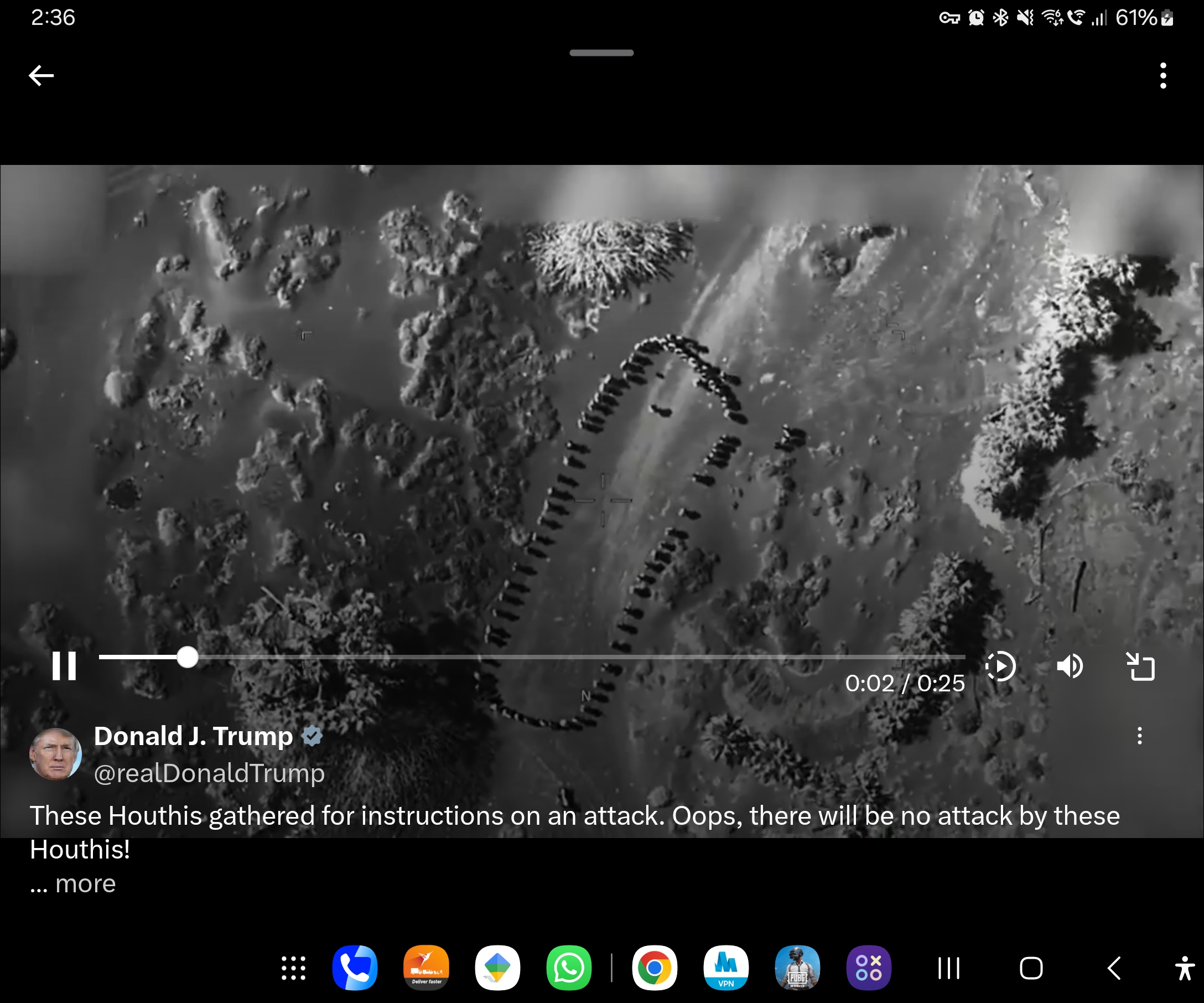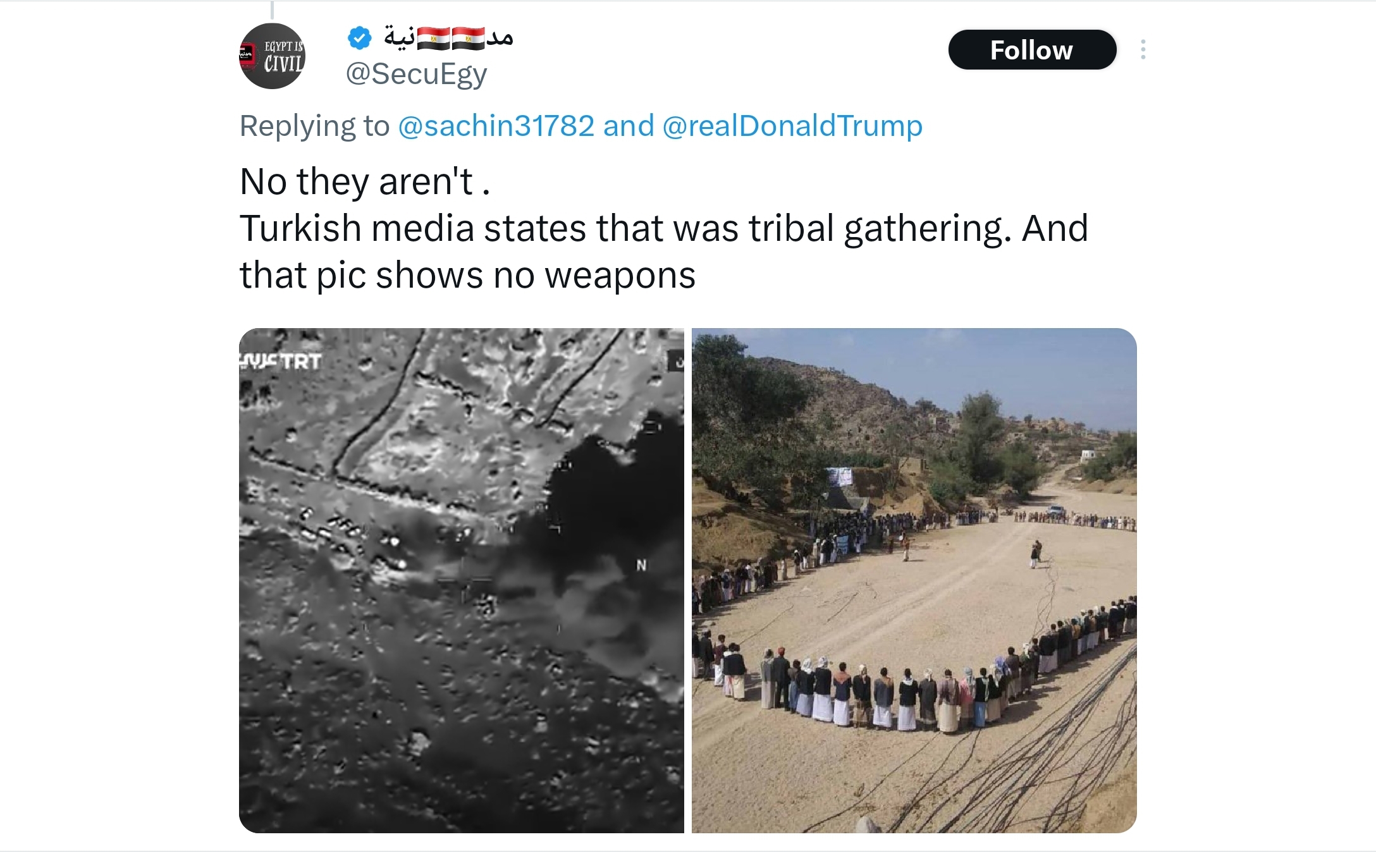
US Air Strike on Yemen - History Repeating Itself
7 Apr 2025 • 6:00 PM MYT

Danny Liew
Writing on military, history, economics, and social issues since 2006.

Screenshot of the X post that the US President had made. Photo credit: Danny Liew.
On 5th April 2025, US President Donald Trump bragged on his X account, the targeting and subsequent air strike on what he had alleged as the meeting of Houthi leaders preparing another round of attack on US war ships and Israeli interest over the waters of Yemen. It is unknown when was the strike nor exactly where the strike had occurred.
Almost immediately, the global netizens began to factcheck him and claimed that the alleged meeting of Houthi leaders were merely Yemeni tribesmen meeting up in celebration of Eid. Some of the netizens even backed up their points with photos of similar meetings between tribemen in the past.

The alleged meeting of Houthi leaders moment before the airstrike hits. Screenshot credit: Danny Liew.
An Egyptian X user posted images of an alleged Eid celebration as proof that the alleged target was actually tribesmen celebrating Eid, claiming that Turkish media had confirmed the US had targeted a tribe's Eid celebration. The X user however, did not provide links to the Turkish media claim, nor a search for such claims could be found.
An Egyptian X user posted images of an alleged Eid celebration as proof that the alleged target was actually tribesmen celebrating Eid, claiming that Turkish media had confirmed the US had targeted a tribe's Eid celebration. The X user however, did not provide links to the Turkish media claim, nor a search for such claims could be found.
 Screesnhot of the X user's claim. Screenshot credit: Danny Liew.
Screesnhot of the X user's claim. Screenshot credit: Danny Liew. Should the X user's claim is verified and that the gathering was merely tribesmen having their Eid celebration, the attack would be an ominous sign of things to come.
Blast from the Past
Back in 1993, the US were part of the United Nations mission in Mogadishu, Somalia. On 5th June 1993, Habr Gidr clan members and the Somali National Army (SNA) loyal to warlord Lt General Farrah Aidid attack a contingent of Pakistani peacekeepers who were inspecting the Radio Mogadishu for clandestine weapons storage, killin 24 Pakistani peacekeepers.
In retaliation, the US forces attached to the United Nation peacekeeping forces launched an air strike on a compound where Habr Gidr clan elders were meeting, alleging they were planning subsequent attacks. In reality, the clan elders met to discuss and pressure Aidid to stop antagonising the peacekeepers.
The attack, dubbed the Bloody Monday, not only did not deter Aidid, but had strengthened his position, culminating in the Battle of Mogadishu on 3rd and 4th October 1993, which had also involved two companies of Malaysian Battalion that were part of the peacekeeping forces. Details of the bloody raid can be watched on the Netflix documentary “Surviving Black Hawk Dowk”, episode 1.
While it is unlikely the Yemenis could retaliate against the US, today's US is unlike the US that we know even a year ago. US President Donald Trump had managed to antagonise nearly the whole world. It would not be a surprise if these countries would purposely close an eye at any retaliations, be it symmetric or assymetric in nature. Worst still, the attack or even the antagonistic nature of the US President may reinvigorate militant groups such as al Qaida and IS. Contrary to Western military doctrine, such groups thrive with the increased perception of injustice.
That said, we will know in a few more months.
For awareness.
ReplyDelete~~~~~
https://t.me/WeTheMedia/122244
To correct this article - NATO intends to deploy a new weapon against the rest of the world - sparking "worldwide blackouts" and blame it on the Kremlin, like they always do🙄:
NATO believes the Kremlin could deploy a new weapon against the rest of the world - sparking "worldwide blackouts" by sabotaging undersea cables with its "shadow fleet". The bosses of firms like Vodafone, Orange and Telefonica, have written an open letter to the UK, EU and NATO warning that the "defenceless" cables can easily be destroyed or disrupted by Russia after a series of attacks.
In the letter, the companies said: "The repercussions of damage to subsea cables extend far beyond Europe, potentially affecting global internet and power infrastructure, international communications, financial transactions and critical services worldwide.
"Subsea cable security must be a cornerstone of broader infrastructure protection efforts. By acting now, we can safeguard the networks that underpin our shared future."
Around 95 per cent of the data transmitted across the world is carried on more than 500 cables that crisscross the seabed. In recent months, there have been a number of attacks already on the vital links.
In the past, the attacks have drawn condemnation from world leaders and defence chiefs who pin the blame squarely on Putin.
While Russia denies any involvement, most countries are convinced Putin's at the helm of the sabotage after seeing Russia's commercial shadow fleet in the area at the time.
READ | XPOST | WTM LINKS